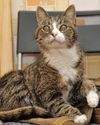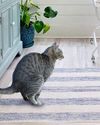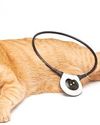
The excitement grows as the queen’s belly expands. You’re counting down the days. Normal pregnancy in cats averages 65 days. Larger litters tend to have slightly shorter gestations, while extremes can range from 54 to 74 days.
Meanwhile, the kittens are growing inside the uterus. As they increase in size, fetal cortisol—also known as “the stress hormone”— rises to a threshold which triggers a cascade of events, including a decrease in progesterone. The decrease in progesterone to a median of 3.18 ng/ml, leads to the stimulation of myometrial contractions, and prompts the beginning of labor.
The Stages of Labor
Stage one of labor is generally the longest stage. The cervix gradually dilates and contractions begin. At this time, the contractions are generally not visible to an observer. A queen in this stage of parturition may display panting, nesting behavior and restlessness. She may also be anorexic and/or nauseous. The first stage may be as short as a few hours or as long as a day.
Stage two begins when active contractions are noticeable. Once these contractions begin, the first kitten should be expected to arrive within four hours. but it is usually closer to one hour. Stage two and stage three—delivery of the placenta—occur at practically the same time since kittens and placenta are usually expelled at the same time or relatively close together.
This story is from the {{IssueName}} edition of {{MagazineName}}.
Start your 7-day Magzter GOLD free trial to access thousands of curated premium stories, and 9,000+ magazines and newspapers.
Already a subscriber ? Sign In
This story is from the {{IssueName}} edition of {{MagazineName}}.
Start your 7-day Magzter GOLD free trial to access thousands of curated premium stories, and 9,000+ magazines and newspapers.
Already a subscriber? Sign In

Life With Patrick
Patrick and Mount Doom

Feline Photographers Part 1
\"Cats never strike a pose that isn't photogenic.\" - Lillian Jackson Braun

The Cat Fancy Alphabet
\"The Cat Fancy Alphabet\" is a new feature in Cat Talk. It highlights various terms and aspects of the cat fancy, educating fanciers new and old about our hobby.

UP CLOSE AND Purr-sonal
If there is one person, or even just a name, that anyone in CFA (Cat Fancier Association) knows, it would have to be Allene Tartaglia. It might be from her involvement with most aspects of the operations of CFA in her position of executive director. Or perhaps from her deep involvement with both the CFA Annual meeting and/or the International Show. Cat Talk thought it was time to learn more about one of the most key people in CFA.

Vision and Hearing Dysfunctions in Senior Cats
Just as people are challenged by having deficiencies with vision and hearing over time, so are senior cats. In senior cats, pet owners may notice their cats are no longer responding to them in the same way; however, it may be difficult to figure out.

Senior Cats and House Soiling
Why is my cat no longer using its litter box? Cat soiling in the house is one of the most talked about issues for pet owners.

Nutrition for Our Senior Cats
From the time they are born, our kittens receive a tremendous amount of care, with diet being at the core of their growth and development.

Fluffy's Sixteen and STILL Plays Like a Kitten!
Enrichment for Senior Cats

Alternative Arthritis Treatments for Cats
Just like humans, cats can experience arthritis. About 90% of cats over the age of 10 years experience osteoarthritis (OA) in at least one joint.1 It is a complex condition involving inflammation and degeneration of one or more joints and is sometimes referred to as degenerative joint disease (DJD). Cats with OA experience pain and inflammation in various joints that interfere with daily activities.

Checklist For What to Look For in Your Club's Next Show Venue
Show Manager To Ring One, Please